Today Current Affairs: 13th March 2021 for UPSC IAS exams, State PSC exams, SSC CGL, State SSC, RRB, Railways, Banking Exam & IBPS, etc
Table of Contents
The BRICS Contact Group on Economic And Trade Issues (CGETI):

The BRICS Contact Group on Economic and Trade Issues (CGETI) leads held their first meeting under India’s Chairship from 9-11 March 2021.
- The theme of BRICS this year is -“BRICS@15: Intra BRICS Cooperation for Continuity, Consolidation, and Consensus”.
- India, under its Chairship in 2021, presented the calendar of events for BRICS CGETI 2021.
- The deliverables proposed are on (i) BRICS Cooperation on Multilateral Trading system including cooperation for the TRIPS Waiver proposal at WTO; (ii) Framework for Consumer Protection in E-Commerce; (iii) Non-Tariff Measures (NTM) Resolution Mechanism; (iv) Sanitary and Phyto-Sanitary (SPS) etc.
- BRICS is the acronym coined to associate five major emerging economies: Brazil, Russia, India, China, and South Africa.
- Originally the first four were grouped as “BRIC” (or “the BRICs”) before the induction of South Africa in 2010.
- The term “BRIC” is believed to be coined by Goldman Sachs.
Genome Mapping In Indian Ocean:
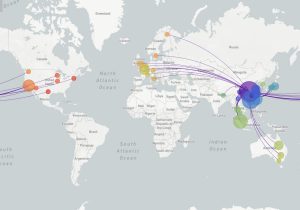
National Institute of Oceanography (NIO) is going to launch the first-of-its-kind project of Genome Mapping in the Indian Ocean.
- The Indian Ocean is the third largest water body in the world, covering about 20% of the Earth’s water surface.
- Aim:
- To gather samples for genome mapping of microorganisms in the Indian Ocean.
- To understand the biochemistry and the response of the ocean to climate change, nutrient stress and increasing pollution.
- Project Cost & Duration: Rs. 25 crores and will take three years to complete.
- A team of scientists and researchers from the NIO onboard its research vessel Sindhu Sadhana will spend 90 days traversing the course of over 10,000 nautical miles in the Indian Ocean on the research project to reveal the internal working of the body of the ocean at a cellular level.
- They will course the Indian Ocean from India’s east coast, Australia, Port Louis in Mauritius and up to the border of Pakistan, off India’s west coast.
Genome Collection:
- The researchers will collect samples from various stretches of the ocean at an average depth of about 5 km.
Just like gene mapping is carried out on blood samples collected from humans, the scientists will map these in the bacteria, microbes found in the ocean. - The mapping of the Deoxyribose Nucleic Acid (DNA) and Ribonucleic Acid (RNA) will show the nutrients present in them, and also those lacking in different parts of the ocean.
“Energy Efficiency Enterprise (E3) Certifications Programme For The Brick Manufacturing Sector”.:

The Ministry of Power has launched the “Energy Efficiency Enterprise (E3) Certifications Programme for the Brick Manufacturing Sector”.
- The E3 Certification Scheme is aimed at tapping huge energy efficiency potential in this sector.
About the Energy Efficiency Enterprise (E3) Certifications Programme:
- E3 certification is an accreditation process focused on the Brick industry. The certification will be provided by the Bureau of Energy Efficiency (BEE).
- It is an initiative to recognize burnt clay brick manufacturers who adopt energy-efficient manufacturing and encourage customers to source bricks from such E3 certified manufacturing units.
- It will be awarded to Brick Manufacturing Enterprises that meet the minimum Specific Energy Consumption (SECVol) performance criteria specified in the Scheme.
- It is a shift from conventional to efficient technologies and product shift towards low-density bricks with better thermal insulation.
- The adoption of the E3 Certification is currently voluntary for the Brick industry.
Brick Manufacturing Sector:
- Contribution in GDP: The brick sector contributes nearly 0.7% to the country’s GDP, offers seasonal employment generation to over 1 crore workers, and has a strong influence on other economic sectors such as transportation and construction.
- Market Size: India is the world’s second-largest producer of bricks and this demand is expected to multiply three to four times over the next 20 years, through the E3 Certification program.
- Energy Consumption: The brick manufacturing industry consumes about 45-50 million tonnes of coal equivalent annually, amounting to 5-15% of the total energy consumption in the country.
- The brick sector has the second-largest potential for energy efficiency amongst the Indian industrial sector after steel and more than cement.
Places Of Worship (Special Provisions) Act, 1991:
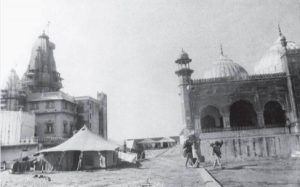
The Supreme Court asked the Centre to respond to a plea challenging the Places of Worship (Special Provisions) Act, 1991 which freezes the status of places of worship as it was on 15th August, 1947.
- In agreeing to examine the law, the court has opened the doors for litigation in various places of worship across the country including Mathura and Varanasi.
About the Places of Worship (Special Provisions) Act, 1991:
- It seeks to maintain the “religious character” of places of worship as it was in 1947 except in the case of the Ram Janmabhoomi-Babri Masjid dispute, which was already in court.
- Section 3 of the Act bans the conversion of a place of worship or even a section of it into a place of worship of a different religious denomination or of a different segment of the same religious denomination.
- Section 4(2) says that all suits, appeals, or other proceedings regarding converting the character of a place of worship (that were pending on 15th August 1947) will come to end when the Act commences and no fresh proceedings can be filed.
- However, legal proceedings can be initiated if the change of status took place after the cut-off date of 15th August 1947 (after enactment of the Act).
- The Act also imposes a positive obligation on the State to maintain the religious character of every place of worship as it existed at the time of Independence.
- This legislative obligation on the State to preserve and protect the equality of all faiths is an essential secular feature and one of the basic features of the Indian Constitution.
LGBTIQ Freedom Zone:
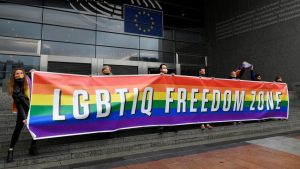
In a resolution adopted, the European Parliament symbolically declared European Union, the entire 27-member bloc as an “LGBTIQ Freedom Zone” – the acronym meaning lesbian, gay, bisexual, trans, non-binary, intersex, and queer.
- The resolution reads, ‘‘LGBTIQ persons everywhere in the EU should enjoy the freedom to live and publicly show their sexual orientation and gender identity without fear of intolerance, discrimination or persecution.
- The move comes as a response against member state Poland’s controversial move to create more than 100 ‘‘LGBTIQ ideology-free zones” around the country since 2019, and more generally against the backsliding of LGBTIQ rights in some EU countries, particularly in Poland and Hungary.
- A majority of countries in the EU (23/27) recognizes same-sex unions, with 16 of them legally recognizing same-sex marriage.
- Poland is part of the small minority that does not acknowledge such relationships.
- Like Poland, Hungary has also been pushing forward a conservative Catholic social agenda. In November 2020, the town of Nagykáta adopted a resolution banning the ‘‘dissemination and promotion of LGBTIQ propaganda’’.
Azadi Ka Amrit Mahotsav:
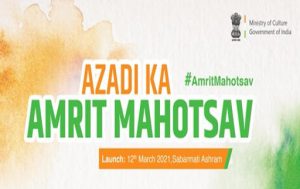
The Prime Minister, Shri Narendra Modi flagged off the ‘Padyatra’ (Freedom March) from Sabarmati Ashram, Ahmedabad and inaugurated the curtain raiser activities of the ‘Azadi Ka Amrit Mahotsav’
- The launch of the ‘Azadi ka Amrit Mahotsav’ 75 weeks before 15 August 2022 will continue till 15 August, 2023.
- The Prime Minister reiterated five pillars i.e. Freedom Struggle, Ideas at 75, Achievements at 75, Actions at 75 and Resolves at 75 as guiding force for moving forward keeping dreams and duties as inspiration.
- The Prime Minister launched the website of India@75 on the occasion.
- He also launched the ‘Atmanirbhar Incubator’ programme of Ministry of Culture in partnership with Sabarmati Ashram Preservation and Memorial Trust to preserve the skills and arts of artisans/crafts persons on the verge of extinction.
- A Charkha has been installed near Magan Niwas at Sabarmati Ashram. It will rotate full circle with each Tweet related to Aatmanirbhar Bharat.
Mera Ration Mobile App:
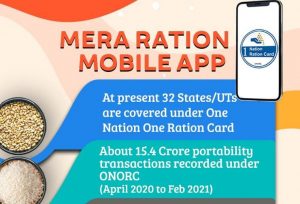
Ministry of Consumer Affairs, Food, and Public Distribution launched Mera Ration Mobile App for the benefit of those ration card holders who move to new places in search of livelihood.
- At present 32 States and Union, Territories are covered under the One Nation One Ration Card (ONORC) and integration of the remaining four States and UTs is expected to be completed in the next few months.
- At present, the system covers nearly 69 Crore National Food Security Act- NFSA beneficiaries in the country.
- The ONORC scheme is being implemented by the Department of Food & Public Distribution under Ministry of Consumer Affairs, Food & Public Distribution for the nation-wide portability of ration cards under National Food Security Act (NFSA).
State Election Commissioners:
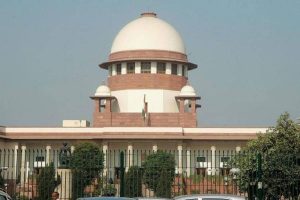
The Supreme Court held that independent persons and not bureaucrats should be appointed State Election Commissioners.
- It said that giving government employees the additional charge of State Election Commissioners is a “mockery of the Constitution”.
- The top court directed that the States should appoint independent persons as Election Commissioners all along the length and breadth of the country.
- The judgment criticized the Goa government for giving its Law Secretary the additional charge of State Election Commissioner.
- Article 243K deals with the Elections to the Panchayats.
- It states that The superintendence, direction, and control of the preparation of electoral rolls for, and the conduct of, all elections to the Panchayats shall be vested in a State Election Commission.
- It shall consist of a State Election Commissioner to be appointed by the Governor.
- Subject to the provisions of any law made by the State Legislature, the conditions of service and tenure of office of the State Election Commissioner shall be such as the Governor may by rule determine. However,
- The State Election Commissioner shall not be removed from his office except in the like manner and on the like ground as a Judge of a High Court.
- The conditions of service of the State Election Commissioner shall not be varied to his disadvantage after his appointment.
First Summit Of The Leaders Of The QUAD:
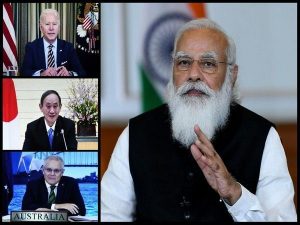
The Prime Minister addressed the first summit of the leaders of the QUAD (Quadrilateral Framework). The meeting was hosted by the USA on a virtual platform.
- Earlier in February 2021, the QUAD ministerial meeting discussed issues across Indo-Pacific and the military takeover in Myanmar.
- QUAD is a grouping of India, the USA, Australia, and Japan that aims to safeguard the interests of democratic nations in the Indo-Pacific region and address global challenges.
- Focus: On pressing crises, such as Covid-19, climate change, and emerging technologies.
- Pledge: QUAD pledged to promote a free, open rules-based order, rooted in international law to advance security and prosperity and counter threats to both in the Indo-Pacific and beyond.
Quad Vaccine Partnership:
- Agreed to ensure “equitable” access to vaccines to counter the pandemic.
- Agreed to a plan to pool their financial resources, manufacturing capabilities, and logistical strengths.
- Japan, the USA, and Australia will finance the vaccine initiative that India has welcomed.
- Appreciated the Vaccine Maitri initiative (India’s Vaccine Diplomacy) of India.
- Vaccine Maitri Initiative is an initiative launched by India to give Covid-19 vaccines to neighboring countries.
India’s Stand:
- QUAD is united by its democratic values and will remain an important pillar of stability in the Indo-Pacific region.
Called the meet an extension of the ancient Indian philosophy ‘Vasudhaiva Kutumbakam’, which regards the world as one family.
America’s Stand:
- QUAD is not a military alliance or North Atlantic Treaty Organization (NATO) equivalent, it is an opportunity to cooperate on economics, technology, climate, and security.
- Maritime security, humanitarian, and disaster response are core to the QUAD agenda.
- QUAD is going to be a vital arena for cooperation in the Indo-Pacific region.
Australia’s Stand:
- QUAD grouping could be the start of a new, permanent and powerful regional grouping of like-minded democracies.
Japan’s Stand:
- Acknowledged the new dynamism that QUAD has received because of the meeting of the top leaders of the member countries.
- It will firmly advance its cooperation to realize a free and open Indo Pacific, and to make a tangible contribution to the peace, stability, and prosperity of the region, including overcoming Covid-19.




